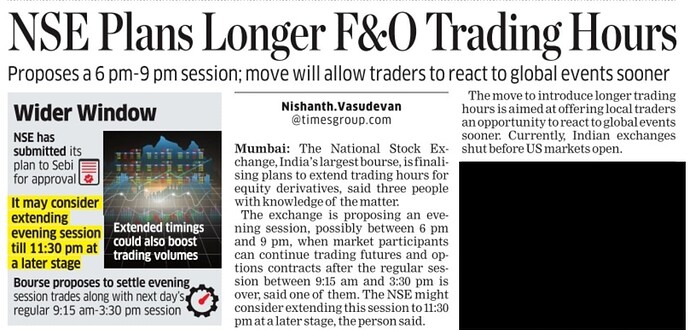Here’s my thoughts regarding extension of trading hours.
Even though BSE is one of the oldest exchange in the world, primary trading activity came in during late 1980s. Since then Indian Stock markets have gone through several changes in the past. During 1980s trading used to be from 12PM to 2.30 PM, just for 2.5 hours only.
In 1990-91, trading hours were extended just by 30 mins more, from 12 PM to 3PM. Until 1992 BSE was the King, since the transactions were offline few brokers who had the right contacts made lot of money. Harshad Mehta scam made it worse which wiped out large part of brokers and retailers.
NSE came in around 1994 which started giving tough competition to BSE in every aspect. When NSE launched its screen based trading called NEAT, so many protest were there, brokers claimed that many would lose jobs. But still NSE went ahead with it.
In 1997 trading hours were extended to 9.55am-3.30pm. Lot of opposition from brokers and traders were there for the extension of timing. Many said they do not have the bandwidth , resources and many protested to revert back to old timings. Nothing happened. Exchanges went ahead with new timing. In 1994, NSE total turnover was just around 6200 Crores, after change in market timing in the year 1997-98 it’s turnover jumped to 9,08,691 crore.
Again in 2009, timings were extended further. Instead of market open at 9:55 am, it was revised to 9am where pre open starts and from 9:15 trading started. I remember there were lot of outcry in the media taking about this new timing. Many opposed it as usual. But since then we have been trading between 9:15 to 3:30 pm. Every time there was a increase in trading hours, it directly denotes more profitability for the exchange.
Now with the new proposal of extension of trading hours, where extended market hours between 6pm to 9pm which eventually will be extended till mid night.
But the deep worry is from large group of active traders who sit in from of system between 9 to 3, who are bombarded with tons of information every second , who are constantly in the urge of making trading decisions. This is a field with high burnout rate. Now with extension of timing, it will be really hard for them. This is one of the main reason why I moved to rule based trading in 2014 and completely moved to automated trading from 2017.
Now there are second set of traders who are more worried, they are system based traders who started their trading journey recently with all kinds of backtest. They are already in worried state because introduction of every day expiry with different indices already started killing their backtest results now with market timing extension they are worried that their backtest won’t be relevant anymore.
Such scenarios always happen. When you build a trading system like breakout/trend following or any kind of setups that are based on market microstructure then there is no need to panic. I use to think all I have to do is create a trading system that gives out standing backtest results and follow it with rigid discipline, but system based trading is much more than that. It took me years to realise this.
Looking at the past am 100% certain that trading hours extension is going to happen for sure. Whether you are prepared or not, it doesn’t really matter. Only thing that is constant in this world is Change. Humans are good in adapting and changing to environments, that’s how we have survived for 1000s of years. So people who complain about this market timing extension will eventually adapt and survive.

